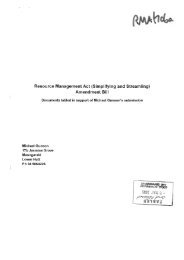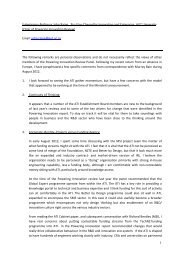Parliamentary Debates (Hansard) - New Zealand Parliament
Parliamentary Debates (Hansard) - New Zealand Parliament
Parliamentary Debates (Hansard) - New Zealand Parliament
You also want an ePaper? Increase the reach of your titles
YUMPU automatically turns print PDFs into web optimized ePapers that Google loves.
16 May 2009 Local Government (Tamaki Makaurau Reorganisation) Bill 3729<br />
see a very familiar pattern. We saw it with Stephen Joyce and the announcement on the<br />
Waterview Connection, and we saw it with Murray McCully in the way he dealt to<br />
NZAID, against the advice of his own officials, and against the advice of the aid<br />
community.<br />
We are seeing a pattern of work that we have seen over the royal commission’s<br />
report on Auckland. It is straight out of the play book of Crosby/Textor. What is done?<br />
The announcement is made, critics are allowed to complain and grizzle, a bit of time is<br />
given, and then the bulldozer is driven on through and finishes the job. Whoever would<br />
have thought that the National Party of the last 3 years in Opposition would get into<br />
Government and ride roughshod over its own manifesto promises? There was a promise<br />
in black and white that it would consult the people of Auckland on the findings of the<br />
royal commission. But has it consulted? No—not one iota! There have been no changes<br />
since 7 April, when Rodney Hide announced what the Government was going to do.<br />
Yet Rodney Hide and John Key have gone around Auckland, talking to mayors and<br />
community groups, and “making nice”—“We’re listening. We’re listening, yeah.<br />
Nothing is set in stone. You know, we really want to hear your views.” But nothing has<br />
changed in the last 5 weeks, and nothing has changed in the last 3 days in this House.<br />
What have we seen in the last 3 days? We have seen an abuse of this House, we have<br />
seen an abuse of the principles of urgency in this House, and on top of that, this<br />
Government has legislated away Aucklanders’ right to a referendum—to have a say, to<br />
have a voice. But do you know what? That is entirely appropriate when we look at the<br />
substance of this legislation, because it is the antithesis of democracy. The bill for<br />
which we are having the third reading sets out the Auckland Transition Agency. But<br />
what is that transition agency but a power grab? It is the abrogation of the democratic<br />
rights of 1.4 million Aucklanders, who 18 months ago voted in their mayors, their<br />
councillors, seven councils, and a regional council. But what is the effect of this<br />
legislation? It takes away their powers. Those councils can do no more than have an<br />
item on the agenda of their meetings for it to be checked and abrogated by the transition<br />
agency. Five hand-picked cronies of Rodney Hide, the “little emperor”, have the power<br />
of Auckland—6,500 employees, $28 billion in assets—sitting in their hands. Who is<br />
“Mr 3 percent” accountable to? Is it to the people of Auckland? I do not think so.<br />
John Carter and Rodney Hide have talked a lot about consultation, in the last few<br />
days—a lot about consultation. Well, let us talk about promises of consultation. Last<br />
night, Nikki Kaye, the MP for Auckland Central, savaged me—it was like being mauled<br />
by a chihuahua as she barked across the Chamber at me—when asking what my policy<br />
was on community boards. I will tell the House what our policy is on community<br />
boards. We believe in real local democracy—real local democracy. We want a second<br />
tier of local government that is actually capable of making a difference to the lives and<br />
communities of Aucklanders—not those ridiculous, pathetic talk shops that the National<br />
Government is foisting on Aucklanders.<br />
Clause 15 of the Local Government (Auckland Council) Bill says that “The Council<br />
may delegate to a local board any of its responsibilities, duties, and powers, except the<br />
ones listed in clause 32(1)(a) to (f) of Schedule 7 of the Local Government Act 2002.”<br />
Let us have a look at that clause. It states that local authorities are not allowed to<br />
delegate setting a rate, making a by-law, borrowing money, purchasing or disposing of<br />
assets, adopting a plan, appointing a chief executive, or adopting or consulting on a<br />
long-term plan or governance statement. Quite frankly, there is actually very little in<br />
this legislation that a local board or community council will be able to do. It is a con<br />
job; the Government says that it wants to consult on it, but if it is serious about that,<br />
why is it legislating away those rights and powers?






![Full evidence text [PDF 8908k] - New Zealand Parliament](https://img.yumpu.com/14025494/1/184x260/full-evidence-text-pdf-8908k-new-zealand-parliament.jpg?quality=85)
![−3 JUN 2009 IRELEASED] - New Zealand Parliament](https://img.yumpu.com/12829724/1/185x260/3-jun-2009-ireleased-new-zealand-parliament.jpg?quality=85)
![Full paper text [PDF 3515k] - New Zealand Parliament](https://img.yumpu.com/11267192/1/184x260/full-paper-text-pdf-3515k-new-zealand-parliament.jpg?quality=85)


![Full evidence text [PDF 9k] - Parliament](https://img.yumpu.com/7938085/1/184x260/full-evidence-text-pdf-9k-parliament.jpg?quality=85)





